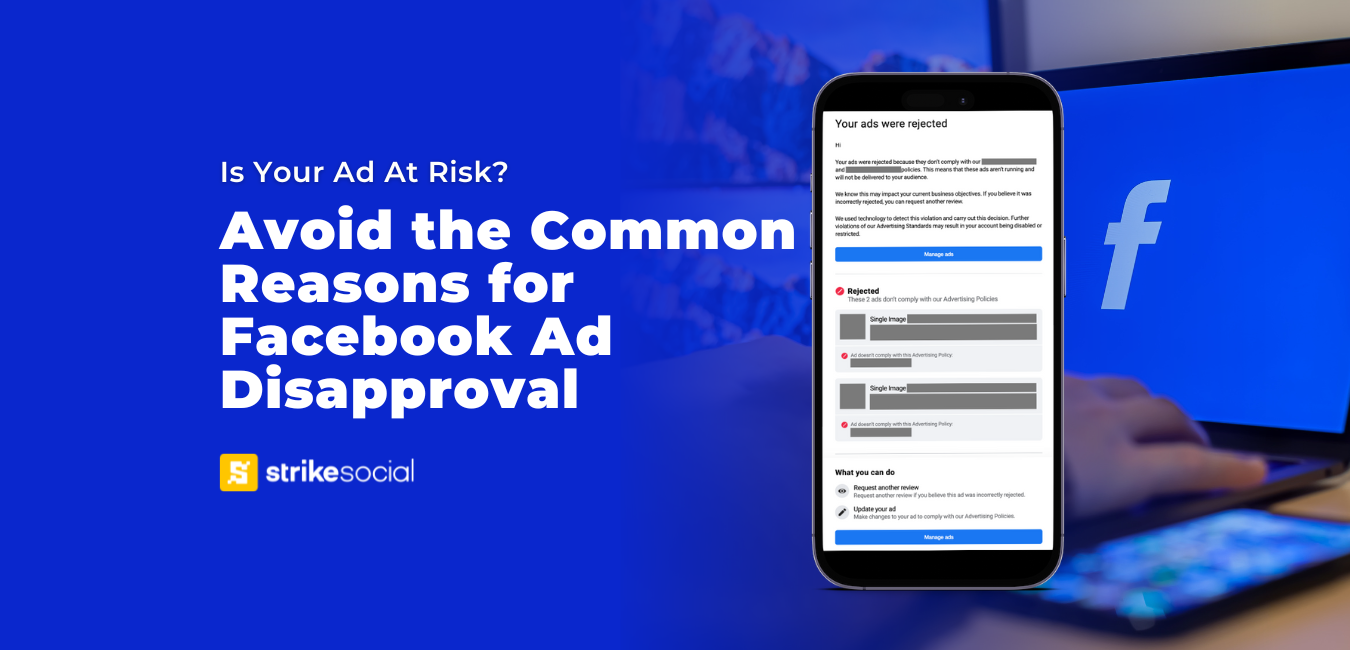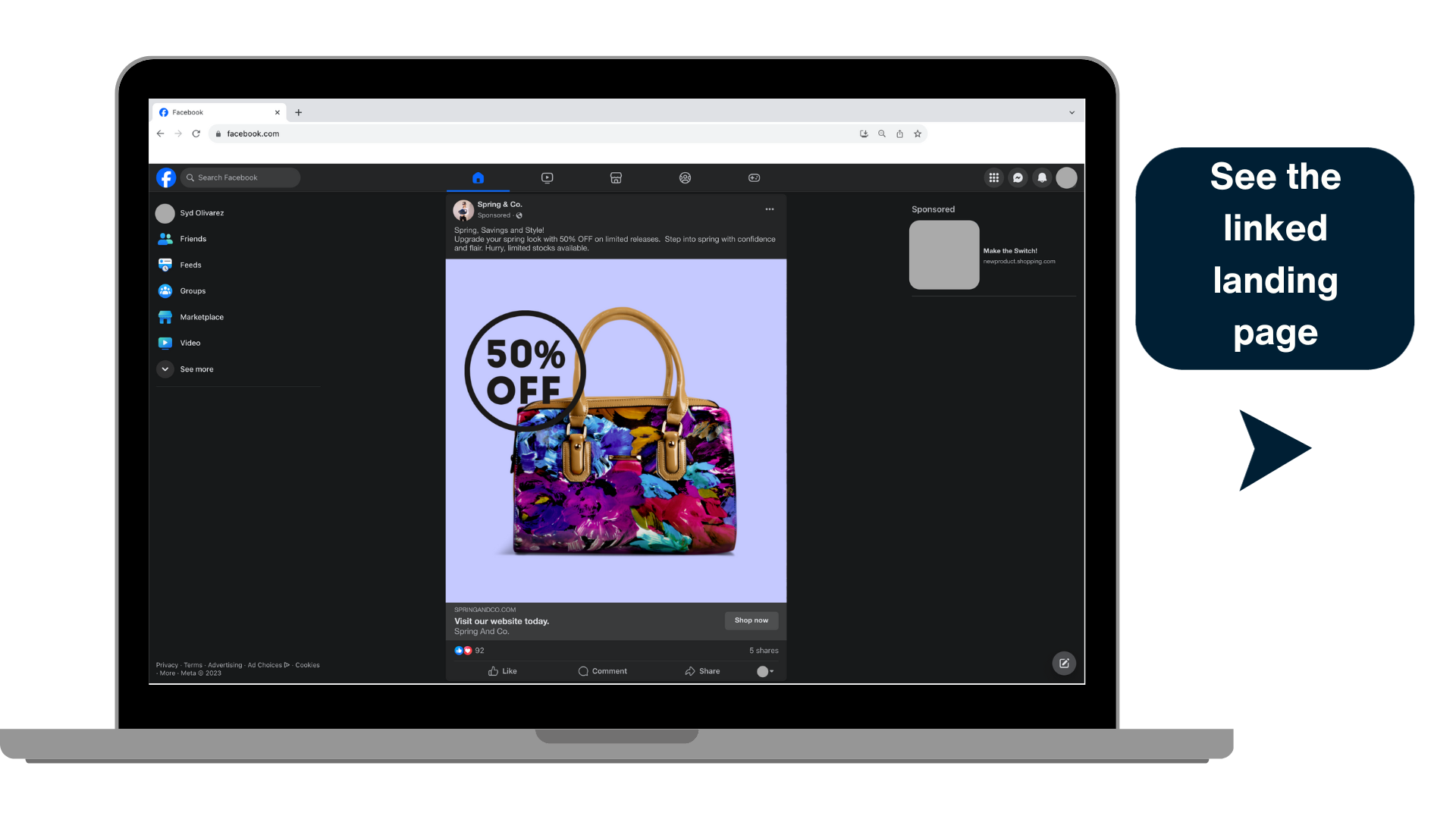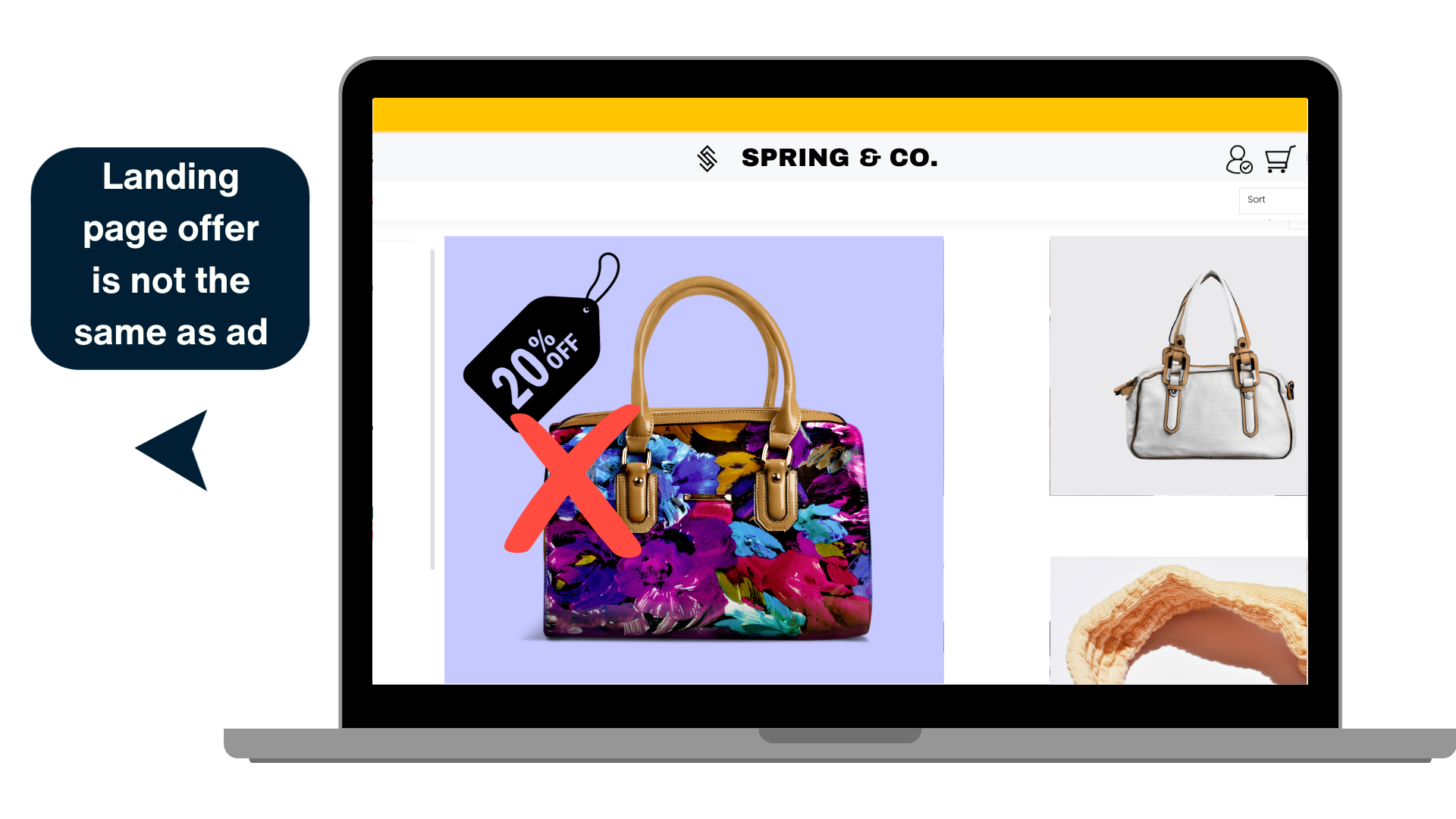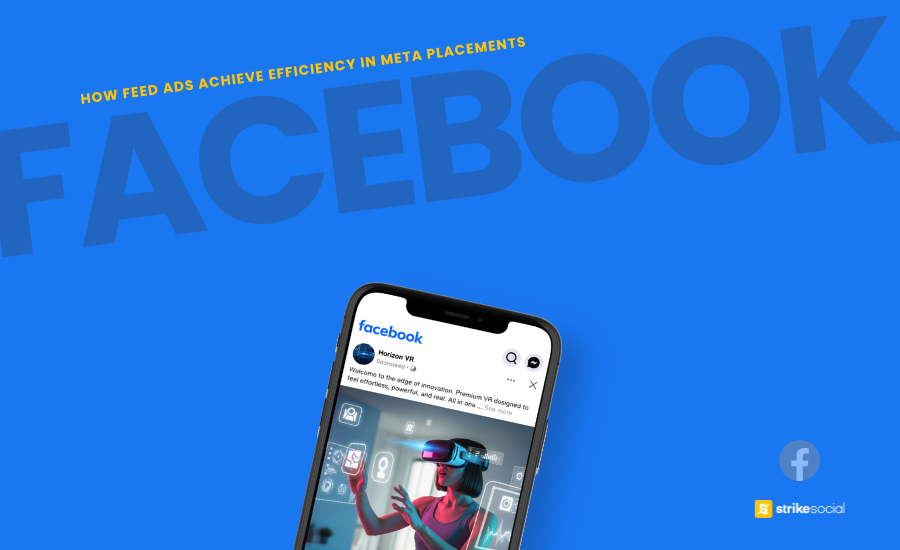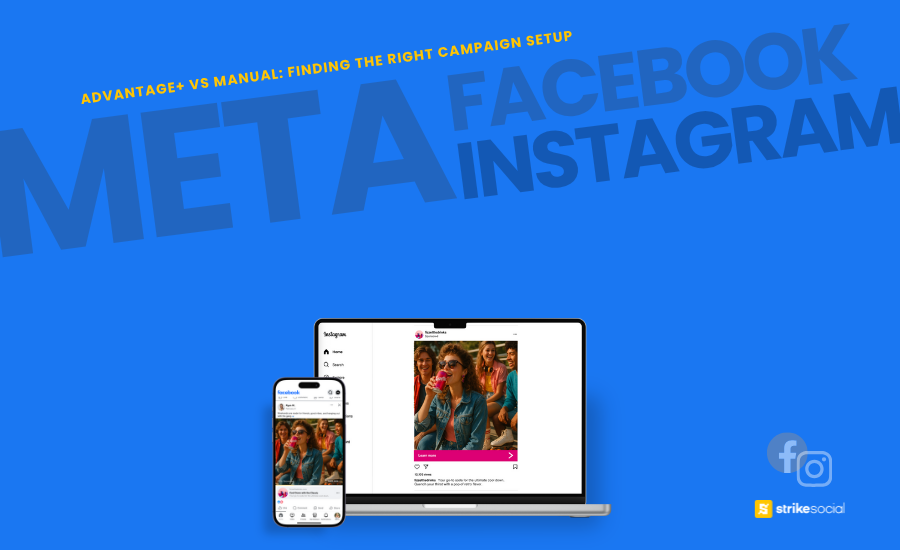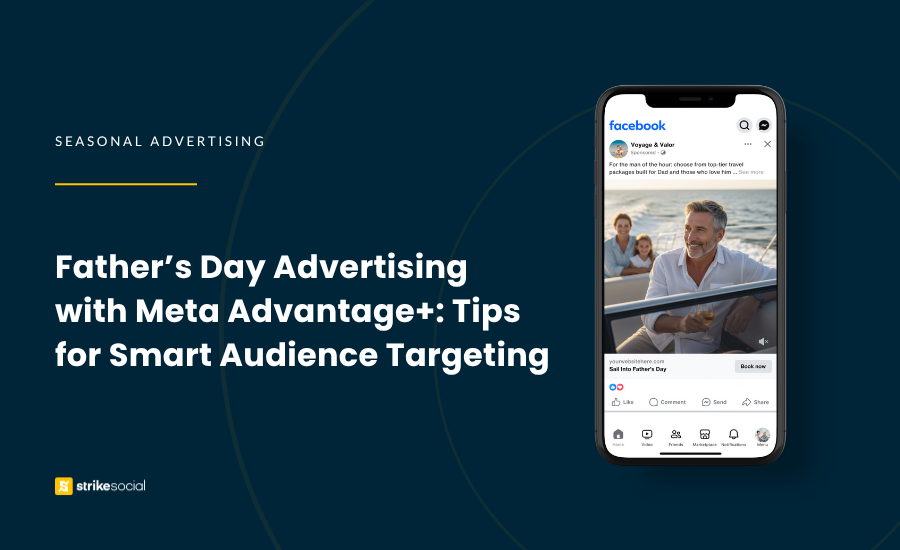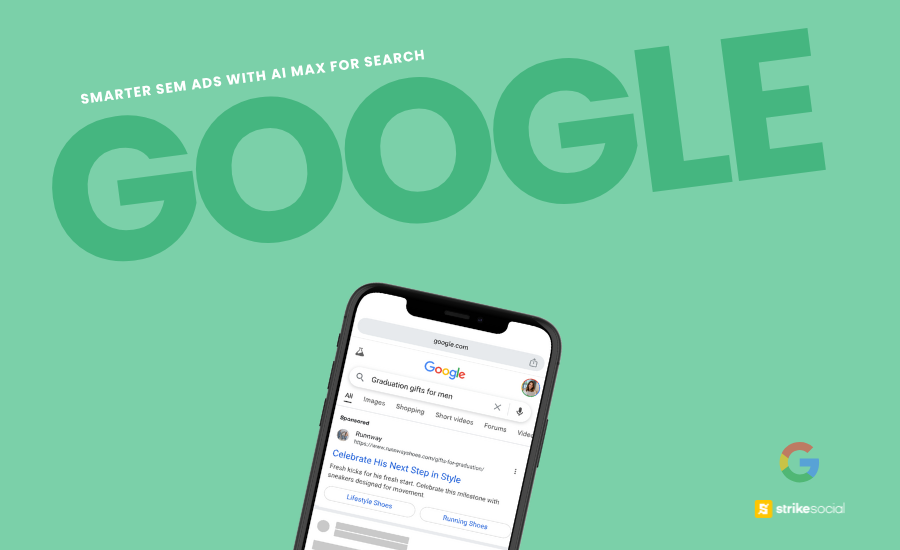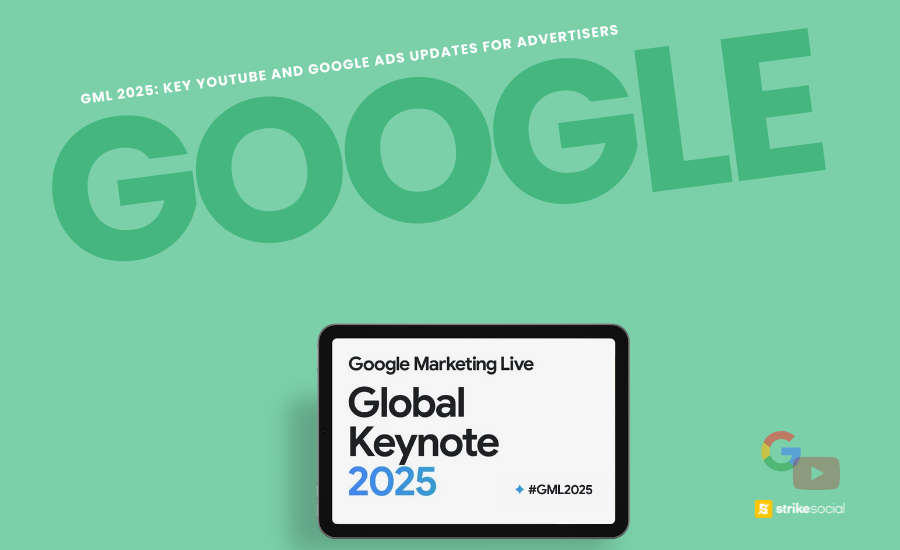Facebook ad rejection reasons can stem from something as innocent as including “CBD” in your ad. Your ad can be flagged and stopped even when it refers to “Central Business District” and not the drug. While you may have confidence in your ads, Facebook’s ad review process can result in unexpected rejections or account suspensions. Even if your ads initially gain approval, there can still be instances where ads get rejected mid-campaign.
In this guide, we’ll troubleshoot Facebook ad rejection reasons and equip you with the knowledge to tackle these hurdles confidently.
Crack the Code to Avoid These Common Reasons for Facebook Ad Disapproval
When you advertise on Facebook, there is more than just the regular review process you should be concerned about. Your ads might undergo random reviews to ensure they align with Facebook’s Advertising Standards. The catch? You won’t know about this review until you are notified that your ads stopped.
So, why let the uncertainty of potential Facebook ad rejection loom over your campaigns? Why fret about the ad rejection reasons when you can be absolutely certain that your ads comply with the guidelines? In this blog, we’ll show you how to ensure that ad disapproval becomes a thing of the past.
- What are the most common reasons for Facebook rejecting ads?
- How can I appeal a Facebook ad rejection?
What are the Most Common Facebook Ad Rejection Reasons?
Facebook’s ad platform provides an extensive range of options for reaching your target audience. However, it also comes with its guidelines that advertisers must strictly follow. There’s nothing more frustrating than receiving an email from Facebook support only to discover that your ad has been disapproved. Therefore, understanding the common reasons for Facebook ad disapproval can help streamline the often tedious ad appeal process.
Prohibited and restricted content
Facebook maintains a stringent stance on what it considers restricted and prohibited content within advertising. Restricted content may receive approval but with specific conditions, often influenced by regional regulations. Prohibited content, including hate speech, violence, and illegal products or services, is unequivocally off-limits.
Examples of prohibited content span a wide spectrum, including:
- Nudity or other sexually suggestive content
- Hate speech, credible threats or direct attacks on an individual or group
- Content that contains self-harm or excessive violence
- Fake or impostor profiles
- Spam
Personal attributes
Another example of Facebook ad rejection reasons are instances when ads directly assert or subtly imply personal attributes. These include but are not limited to race, ethnicity, religion, age, or sexual orientation. Be cautious not to target or discriminate against users based on these characteristics inadvertently.
Unrealistic claims
Facebook takes a strong stance against ads that make exaggerated or unattainable claims. If your ad promises something unrealistic or impossible, it’s likely to be rejected. For instance, claiming a whitening lotion can quickly lighten skin tone in two days would not meet Facebook’s standards.
Maintaining integrity in your advertising is essential to offering achievable and credible promises to your audience.
Special ad categories
These categories encompass credit, employment, and housing-related ads and come with specific guidelines that advertisers must be aware of.
One notable feature of Special ad categories is their more limited audience targeting options compared to standard ad categories. Age targeting, geographical targeting, exclusions, and lookalike audiences are all subject to stricter limitations under Facebook ad compliance guidelines. Advertisers can create specialized saved audiences designed to focus solely on their desired database or audience.
Ad rejections beyond ad content
It’s not just about the content and images within your ad; the destination of your links plays a critical role. Facebook assesses the legitimacy and security of the links you provide. Ads that direct users to non-secure or unsafe domains will likely fail the Facebook ad review process.
Facebook ad guidelines on external links
You may get your ad denied on Facebook if your links commit any of the following infractions:
- Misleading links that deceive users
- Landing pages lacking transparency and trustworthiness
- Distribution of fake news
- Inconsistent domains where the displayed URL doesn’t match the actual destination
- Broken links leading to frustrating user experiences
Media buyers must recognize that the adjustments needed for each ad can differ significantly. Dig deeper into Facebook’s terms and guidelines to determine the specific reasons why your ads were not approved. By closely examining these factors, you can identify precisely why your ads may be rejected on the platform.
How Can I Appeal a Facebook Ad Rejection?
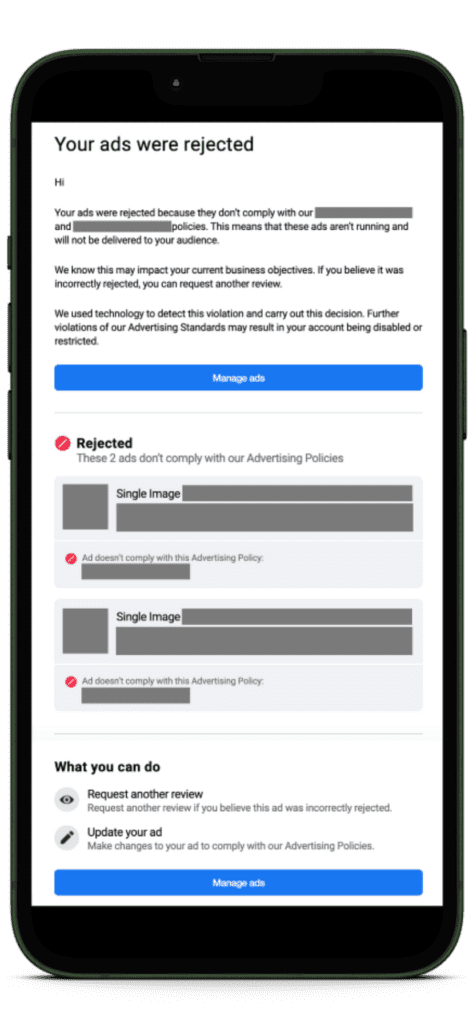
When your ads get denied on Facebook, you must note the steps you must take. Here’s a breakdown of what happens and how to address it:
- You will receive an email alerting you that your ad has been stopped.
Pro tip: Remain vigilant against spam emails masquerading as Facebook notifications – these are common forms of identity theft. Only trust emails from legitimate Facebook domains.
- The email notification should contain vital information, including:
- The specific Facebook advertising policies or standards that your ad violated
- Detailed information about the rejected ad/s:
- Name of the ad
- A preview of the ad copy
- Identification of the specific policy or standard that the ad did not comply with
- A button directing you to the Ad Manager, allowing you to make necessary updates to your ads
How to Resubmit an Ad Denied on Facebook
Now that you have uncovered the Facebook ad rejection reasons, it’s time to address the issue and make the necessary corrections.
- Start by going to Ads Manager.
- Select the ads you wish to edit by checking the boxes.
- Select the Edit option. This opens a side panel where you can make the necessary adjustments to your ad. Your edits will vary depending on the specific reason for the rejection (related to a Facebook advertising policy or standard).
You can make changes to:- Ad names
- The Facebook Page associated with the ad
- Images or videos used in the ad
- If needed, you can also customize images or videos for specific ad placements within the ad set.
- If all required changes have been completed, click on Publish. This makes sure that the edits you made are active.
Your ad will again undergo the Facebook ad compliance check, and it will go live upon approval.
How to Resolve Ads Incorrectly Rejected by Facebook
If you believe your ads were wrongly rejected on Facebook, an ad appeal process is in place to address such issues.
- First, go to Business Support Home.
- Identify the account or catalog containing the ads that were rejected.
- Choose the specific ads, ad sets, or campaigns you believe were incorrectly rejected.
- Click on the information (i) icon to access a detailed explanation of why your ad was rejected.
- If you firmly believe your ad should not be rejected, click Request Review. This is your opportunity to provide additional context and information that supports your claim, explaining why your ad should go live.
After supplying the necessary details, click Submit to request a review officially.
You can keep tabs on the status of your review request within Business Support Home. If Facebook reevaluates and reverses its initial decision, your ad will align with the status of your campaign. If your campaign is active, your ad will automatically resume delivery.
However, you cannot request another review if you receive another Facebook ad disapproval. The ad will then remain in a rejected state.
Requesting a review for your rejected ad offers a unique advantage. Unlike the initial ad review, reevaluation requests undergo a more thorough assessment by teams of human reviewers. This process aims to rectify errors and ensure fairness in ad approvals.
It’s worth highlighting that seeking a review will not adversely affect your association with Meta. Instead, it signifies a standard practice promoting transparency and fairness within the Facebook ad review process.
Your Complete Guide to Resolving Facebook Ad Rejection Reasons
From the onset, we emphasized the importance of proactive compliance with Facebook’s strict standards. When advertising, in general, compliance with the platform’s exacting standards is non-negotiable. Random ad reviews require vigilance to prevent Facebook ad rejection reasons that can halt your campaigns unexpectedly.
Get yourself armed with a deep understanding of the rules, the ability to make crucial adjustments, and the knowledge to effectively maneuver Facebook’s ad review process.
Expand your expertise. Browse Strike Social’s latest blogs here:
- How Facebook Feed Ads Achieve Efficiency in Meta Placements

- Inside Strike Social’s Media Buyer Training 2025

- Finding Cost Efficiency in Meta Ads: Advantage+ vs. Manual Campaigns

- Father’s Day Advertising with Meta Advantage+: Tips for Smart Audience Targeting

- Smarter Paid Search with Google’s AI Max for Search Campaigns

- Google Marketing Live 2025 Recap: Key YouTube and Google Ads Updates for Advertisers



